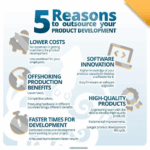Let’s play a quick game. Think of five big brands you loved as a kid but no longer see. Got them? Now, ask yourself—why did they disappear?
Chances are, they failed to develop and introduce new products while their competitors evolved. The business world is ruthless; companies that stick to the same old formula risk becoming outdated, ignored, and eventually extinct.
From tech giants to small businesses, every company needs continuous innovation to stay ahead. But why is new product development so crucial? What happens if a company stops evolving? And most importantly, how can businesses make product development work for them rather than against them?
Let’s explore why introducing new products is not just an option—it’s a necessity!
- Staying Relevant in a Rapidly Changing Market
Customers today are spoiled for choice. New trends, better technology, and changing consumer behavior make it impossible for businesses to survive on one successful product forever.
What happens if a company doesn’t innovate?
- It becomes boring (and no one wants to be boring).
- Competitors introduce better, more exciting products.
- Customers move on, leaving the company struggling to survive.
What happens if a company keeps innovating?
- It stays top-of-mind for customers.
- It attracts new audiences while keeping existing customers engaged.
- It creates a future-proof brand that thrives even in unpredictable markets.
Real-world example:
Remember Nokia? They dominated the mobile phone industry but failed to evolve when smartphones took over. Meanwhile, Apple and Samsung kept introducing new, innovative models—and the rest is history.
- Meeting Customer Needs (Before They Even Know They Need It!)
Have you ever bought something you didn’t know you needed until you saw it? (Looking at you, air fryers and robot vacuums.) That’s the power of anticipating customer needs through new product development.
Companies that introduce new products can:
- Solve problems that customers didn’t even realize they had.
- Offer better, faster, or more convenient solutions.
- Stay ahead of the competition by being the first to innovate.

Real-world example:
Think about Netflix. They started as a DVD rental service but pivoted into streaming before people even realized how much they would love it. Now? They dominate the entertainment industry.
If they had stuck to DVDs, they’d be as relevant as a Blockbuster rental card today.
3. Gaining a Competitive Edge
The business world is a battlefield, and companies that innovate are the ones that survive. If you’re not offering something new, your competitors definitely will—and they’ll steal your customers while they’re at it.
Why should companies develop and introduce new products? Because:
- It keeps them ahead of competitors who are also fighting for market share.
- It allows them to set trends instead of following them.
- It prevents stagnation—a slow killer for any business.
Example:
Imagine if Starbucks had never expanded beyond regular coffee. They took a risk by introducing seasonal drinks, cold brews, and plant-based options, keeping them one step ahead of competitors.
Now, every time you hear “Pumpkin Spice Latte”, you think of Starbucks. That’s the power of staying ahead.
- Boosting Sales and Business Growth
Let’s be honest—at the end of the day, businesses need sales to survive. And nothing drives sales better than fresh, exciting products that customers actually want.
New products help businesses:
- Increase revenue streams—more products = more opportunities to sell.
- Reach new customer segments—a broader audience means higher profits.
- Stay profitable in changing markets—because relying on one product is too risky.

Example:
Coca-Cola doesn’t just sell Coke. They have Diet Coke, Coke Zero, flavored sodas, energy drinks, and even bottled water. If they had stuck to just one type of soda, they would have lost out on billions in revenue.
5. Adapting to Technological Advancements
Technology is moving at lightning speed. If businesses don’t keep up, they risk becoming irrelevant overnight.
Why should companies develop and introduce new products in a tech-driven world?
- To integrate smart features (think AI, automation, or digital convenience).
- To ensure efficiency and better user experience.
- To future-proof their brand against rapid changes.

Example:
The automobile industry is shifting towards electric vehicles (EVs). Companies like Tesla have led the charge, while traditional automakers like Ford and BMW are now scrambling to catch up.
The lesson? Adapt early, or get left behind.
6. Strengthening Brand Loyalty
Customers love brands that evolve with their needs. When a company consistently brings fresh, exciting products to the table, customers stay engaged and loyal.
New products help businesses:
- Keep customers coming back for more.
- Build a reputation as an industry leader.
- Create buzz and excitement around their brand.

Example:
Apple’s product launches are global events. Why? Because they’ve built a culture of anticipation and loyalty. Customers don’t just buy their products—they wait for them, line up for them, and talk about them for months.
That’s what happens when you constantly innovate.
- Exploring New Markets and Expanding Globally
A company that only sells one type of product in one market limits its own potential. The more products you introduce, the more global expansion opportunities you unlock.
Why should companies develop and introduce new products for expansion?
- Different markets have different needs—new products = new opportunities.
- It allows businesses to adapt to local trends and demands.
- It creates a global presence, leading to long-term success.
Example:
Fast-food chains like McDonald’s create customized menu items for different countries. McSpaghetti in the Philippines, Paneer Burgers in India, and Teriyaki Burgers in Japan—these localized innovations make McDonald’s a global success story.
Conclusion:
So, why should companies develop and introduce new products? Because it’s the difference between thriving and disappearing. Businesses that fail to innovate lose customers, revenue, and relevance. Meanwhile, those who embrace change and develop new products stay at the top of their game.
If history has taught us anything, it’s this: stagnation is a slow death in business. Because in the world of business, the brands that dare to create, evolve, and take risks are the ones that win in the end.
So, whether you’re a startup or a Fortune 500 company, the only way forward is innovation. Let’s innovate new ideas together with Brand New MD!









